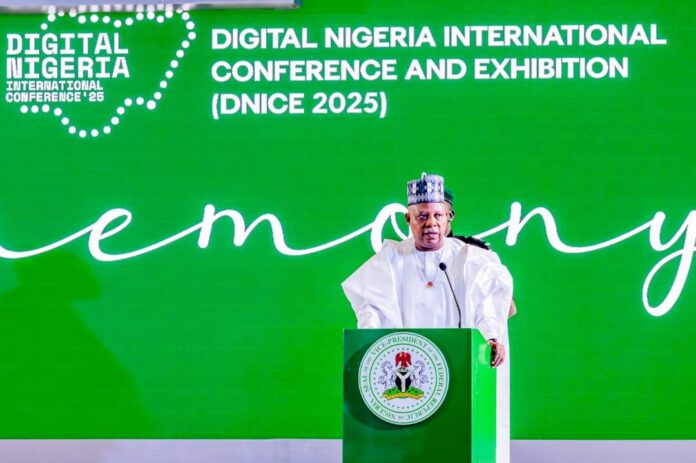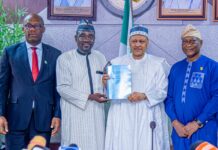Nigeria Set to Pass Digital Economy and E-Governance Bill into Law — Shettima
By Lukman Oladokun
The Nigerian Vice President, Senator Kashim Shettima, has stated that the country is on the cusp of a historic transformation as the government advances shetttoward passing the National Digital Economy and E-Governance Bill into law.
Senator Shettima made this known in Abuja while officially opening the 2025 edition of the Digital Nigeria International Conference and Exhibition, themed “Innovation for a Sustainable Digital Future: Accelerating Growth, Inclusion, and Global Competitiveness.”
He described the bill as a cornerstone of the nation’s ambition to build a $1 trillion economy powered by digital innovation. Emphasizing its significance, he noted that the bill represents more than legislative reform—it is “a strategic leap toward embedding technology into the fabric of governance, economic planning, and national development.”
Drawing a compelling parallel with Nigeria’s cashless policy, which catalysed the fintech revolution, the Vice President said the anticipated impact of the new bill would ignite a govtech revolution.
“Just as the cashless policy unlocked the fintech revolution, this new bill will unlock the govtech revolution—an era of smarter governance, greater transparency, and inclusive service delivery,” he declared.
He explained that this new era would be defined by smarter governance, greater transparency, and inclusive service delivery, all driven by digital tools and infrastructure. He stressed that the bill is part of a broader national strategy to position Nigeria as a global leader in digital innovation, with the potential to transform every sector of society.
The Vice President outlined a series of initiatives that complement the bill, including the integration of digital literacy into school curricula and the digitization of the informal sector to bring millions of Nigerians into the formal economy.
He highlighted the 3 Million Technical Talent Program, which aims to develop world-class expertise and establish Nigeria as a hub for digital skills.
Addressing the youth directly, he called them the “lifewire of our nation,” urging them to embrace their roles as innovators, disruptors, and dreamers who turn possibilities into profits. “You are the innovators, the disruptors, the dreamers who turn possibilities into profits. It is because of you that we are creating an enabling environment that encourages innovation. The language of our long-term stability is digital,” he remarked.
On the government’s infrastructure efforts, the Vice President noted that major projects such as the Broadband Superhighway—designed to deliver high-speed internet across the country—and the Bridge and 7-7-4 initiatives, which aim to ensure that startups in remote towns like Gusau have the same digital access as those in major cities like Abuja and Lagos, are ongoing.
Underscoring the need for equal access to digital infrastructure, he noted that equitable connectivity is not just a matter of fairness but a prerequisite for national competitiveness in the digital age.
On the policy front, Senator Shettima celebrated Nigeria’s emergence as a leading fintech ecosystem, attributing this success to bold reforms and a forward-thinking regulatory environment.
He said the new bill, once enacted, would build on this momentum by establishing a unified legal framework for digital governance, electronic transactions, and cybersecurity.
This framework would also strengthen key institutions such as the National Information Technology Development Agency (NITDA), the Nigerian Communications Commission (NCC), and the Nigerian Data Protection Commission (NDPC), ensuring that Nigeria’s digital ecosystem is both innovative and secure.
Painting a vivid picture of the digitally empowered Nigeria he envisions, Senator Shettima expressed optimism about a future where farmers use real-time market data to secure fair prices, young women in rural communities work remotely for global companies, and universities produce graduates equipped with the skills to thrive in the global digital economy. He emphasized that digital transformation must be inclusive, touching every corner of the country and every segment of society.
Declaring the conference officially open, the Vice President urged participants to seize the moment and contribute meaningfully to Nigeria’s digital transformation, expressing confidence that the outcomes of the conference would shape the country’s future.
He concluded by affirming the administration’s commitment to ensuring that digital innovation drives opportunity, inclusion, and prosperity for all Nigerians.
The conference was attended by a distinguished array of stakeholders, including Dr. Bosun Tijani, Minister of Communications, Innovation, and Digital Economy; Kashifu Inua Abdullahi, Director General and CEO of NITDA; Dr. Aminu Wada, Executive Vice Chairman of the NCC; Dr. Vincent Olatunji, CEO of the NDPC; Professor Abdullahi Yusuf Ribadu, Executive Secretary of the National Universities Commission; and Engineer Margaret Aina Oguntola, President of the Nigerian Society of Engineers.
Also present were members of the diplomatic corps, service chiefs, heads of paramilitary agencies, senior government officials, and leaders from academia and industry.















